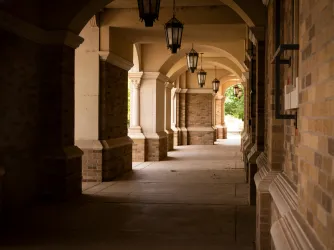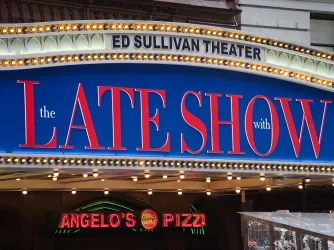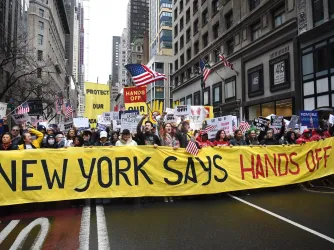Table of Contents
FIRE calls on Stanford University to put out fires on its own campus

Alexander Davidovich / Shutterstock.com
Stanford University Hoover Tower at Sunset.
Today, Stanford College Republicans (SCR) will host conservative commentator Matt Walsh, known lately for his “What is a Woman?” tour during which he screens his documentary of the same name. The lead-up to this event has been all the hubbub on campus, with the Undergraduate Senate approving funding to avoid conflicts with its policies, passing a resolution condemning the event, and allocating funds for counter-protests against Walsh.
Stanford University — one of the most selective institutions in California, alma mater of President Herbert Hoover and four Supreme Court Justices — holds students to “the Fundamental Standard,” which requires them to “uphold the integrity of the university as a community of scholars in which free speech is available to all” and to “respect the rights of all.”
So what happens when those values are put to the test?
Apparently, arson and vandalism.
Stanford guides its students on how the Standard interacts with rights of free speech and expression protected by California’s Leonard Law. This guidance informs students that “the corollary to free speech is the freedom not to be held as a captive audience . . . you have the right to walk away.” Stanford’s President, Marc Tessier-Lavigne, has spoken and written about what this means when controversial speakers come to campus. In comments to the campus, he stated that “actions aimed not at engaging with and debating ideas but rather at suppressing them . . . go counter to what is needed to foster the open inquiry that our mission calls for.”
SCR’s reporting insinuates that rather than exercising their right to walk away or express disagreement without disrupting the event, Stanford students interfered with SCR’s speech directly. On Feb. 17, 12 days out from the event, SCR tweeted that students had torn down and burned flyers advertising Walsh’s event. Continuing to today, SCR continued to face difficulties advertising the event. And Stanford remains silent on the issue.
Stanford has an obligation to protect the expressive rights of its students, including the students who bring controversial speakers to campus.
FIRE, therefore, wrote President Tessier-Lavigne today asking him to stand up for students bringing a controversial speaker to campus, and to affirm their right of free expression on campus.
As we told Stanford today:
Stanford has an obligation to protect the expressive rights of its students, including the students who bring controversial speakers to campus. To the extent that students have torn down and burned these flyers, those students’ actions are beyond what Stanford can allow while also upholding its commitment to free expression.
Stanford’s inaction isn’t the only issue. To make matters worse, the event management and ticketing service Eventbrite pulled the SCR event from its website. The company might have had the right to do so, but the decision directly contradicts its stated mission of providing a “global self-service ticketing platform for live experiences that allows anyone to create, share, find and attend events that fuel their passions and enrich their lives.”
More generally, the apparent rise in private sector speech policing — including by companies with significant censorial power — isn’t conducive to a healthy culture of free expression. Free speech culture issues can raise thorny questions about competing interests, but as FIRE recently explained after major crowdfunding platforms canceled campaigns to raise money to publish comic books deemed offensive:
The more that powerful institutions and platforms converge around intolerance of certain views or succumb to pressure campaigns to silence speakers — and the larger the set of verboten beliefs grows — the less people will talk openly on important issues or push artistic boundaries. In other words, we’ll reap fewer of the cultural and democratic benefits made possible by the First Amendment’s strong protection of free speech from government interference.
A society that believes strongly in free speech as a cultural value doesn’t pull the levers of the government or the private sector to suppress disfavored speech. It instead meets that speech with dialogue and criticism. And institutions in that society prepare future leaders to peacefully express their disagreement and to either find common ground or to agree to disagree.
Eventbrite may not care about fostering a culture of free expression, but an institution of higher education like Stanford certainly should. Stanford’s leaders need to walk the walk, and affirm their commitment to free speech. FIRE will keep pressure on them until they do.
FIRE defends the rights of students and faculty members — no matter their views — at public and private universities and colleges in the United States. If you are a student or a faculty member facing investigation or punishment for your speech, submit your case to FIRE today. If you’re faculty member at a public college or university, call the Faculty Legal Defense Fund 24-hour hotline at 254-500-FLDF (3533). If you’re a college journalist facing censorship or a media law question, call the Student Press Freedom Initiative 24-hour hotline at 717-734-SPFI (7734).
Recent Articles
Get the latest free speech news and analysis from FIRE.

He refused to censor his syllabus — so Texas Tech cancelled his class

Fandom’s lighthouse in a sea of censorship

FIRE statement on Stephen Colbert’s James Talarico interview and continued FCC pressure



